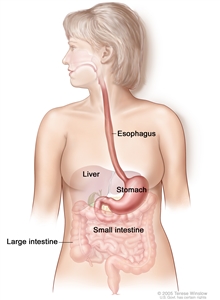Esophageal Cancer Prevention
Avoiding risk factors and increasing protective factors may help prevent cancer.
Avoiding cancer risk factors may help prevent certain cancers. Risk factors include smoking, having overweight, and not getting enough exercise. Increasing protective factors such as quitting smoking and exercising may also help prevent some cancers. Talk to your doctor or other health care professional about how you might lower your risk of cancer.
The risk factors and protective factors for squamous cell carcinoma of the esophagus and adenocarcinoma of the esophagus are not the same.
The following risk factors increase the risk of squamous cell carcinoma of the esophagus:
Smoking and alcohol use
Studies have shown that the risk of squamous cell carcinoma of the esophagus is increased in people who smoke or drink a lot.
The following protective factors may decrease the risk of squamous cell carcinoma of the esophagus:
Avoiding tobacco and alcohol use
Studies have shown that the risk of squamous cell carcinoma of the esophagus is lower in people who do not use tobacco and alcohol.
Chemoprevention with nonsteroidal anti-inflammatory drugs
Chemoprevention is the use of drugs, vitamins, or other substances to help lower a person's risk of developing cancer. Nonsteroidal anti-inflammatory drugs (NSAIDs) include aspirin and other drugs that reduce swelling and pain.
Some studies have shown that the use of NSAIDs may lower the risk of squamous cell carcinoma of the esophagus. However, the use of NSAIDs increases the risk of heart attack, heart failure, stroke, bleeding in the stomach and intestines, and kidney damage.
The following risk factors increase the risk of adenocarcinoma of the esophagus:
Gastric reflux
Adenocarcinoma of the esophagus is strongly linked to gastroesophageal reflux disease (GERD), especially when the GERD lasts a long time and severe symptoms occur daily. GERD is a condition in which the contents of the stomach, including stomach acid, flow up into the lower part of the esophagus. This irritates the inside of the esophagus, and over time, may affect the cells lining the lower part of the esophagus. This condition is called Barrett esophagus. Over time, the affected cells are replaced with abnormal cells, which may later become adenocarcinoma of the esophagus. Obesity in combination with GERD may further increase the risk of adenocarcinoma of the esophagus.
The use of medicines that relax the lower sphincter muscle of the esophagus may increase the likelihood of developing GERD. When the lower sphincter muscle is relaxed, stomach acid may flow up into the lower part of the esophagus.
It is not known if surgery or other medical treatment to stop gastric reflux lowers the risk of adenocarcinoma of the esophagus. Clinical trials are being done to see if surgery or medical treatments can prevent Barrett esophagus.
The following protective factors may decrease the risk of adenocarcinoma of the esophagus:
Chemoprevention with nonsteroidal anti-inflammatory drugs
Chemoprevention is the use of drugs, vitamins, or other substances to help lower a person's risk of developing cancer. Nonsteroidal anti-inflammatory drugs (NSAIDs) include aspirin and other drugs that reduce swelling and pain.
Some studies have shown that the use of NSAIDs may lower the risk of adenocarcinoma of the esophagus. However, the use of NSAIDs increases the risk of heart attack, heart failure, stroke, bleeding in the stomach and intestines, and kidney damage.
Radiofrequency ablation of the esophagus
Patients with Barrett esophagus who have abnormal cells in the lower esophagus may be treated with radiofrequency ablation. This procedure uses radio waves to heat and destroy abnormal cells, which may become cancer. Risks of using radiofrequency ablation include narrowing of the esophagus and bleeding in the esophagus, stomach, or intestines.
One study of patients who have Barrett esophagus and abnormal cells in the esophagus compared patients who received radiofrequency ablation with patients who did not. Patients who received radiofrequency ablation were less likely to be diagnosed with esophageal cancer. More studies are needed to know whether radiofrequency ablation decreases the risk of adenocarcinoma of the esophagus in patients with these conditions.
Cancer prevention clinical trials are used to study ways to prevent cancer.
Cancer prevention clinical trials are used to study ways to lower the risk of developing certain types of cancer. Some cancer prevention trials include healthy people who may or may not have an increased risk of cancer. Other prevention trials include people who have had cancer and are trying to prevent recurrence or a second cancer.
The purpose of some cancer prevention clinical trials is to find out whether actions people take can prevent cancer. These may include eating fruits and vegetables, exercising, quitting smoking, or taking certain medicines, vitamins, minerals, or food supplements.
New ways to prevent esophageal cancer are being studied in clinical trials.
Information about clinical trials supported by NCI can be found on NCI's clinical trials searchclinical trials search webpage. Clinical trials supported by other organizations can be found on the ClinicalTrials.govClinicalTrials.gov website.
